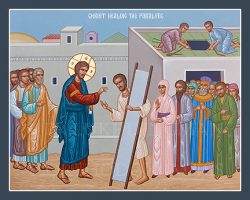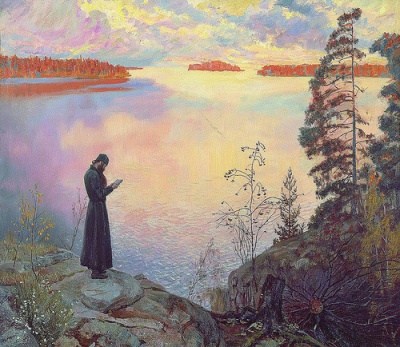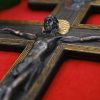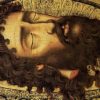
Hebrews 1:10-2:3; Mark 2:1-12
Imagine how you would react if you went to the doctor to be cured of a disease and were told in response “Your sins are forgiven.” You would probably look for another physician pretty quickly. We seek medical care in order to regain our health, not to be forgiven for wrongs we have done. How sad, then, when we approach Christ wanting only forgiveness without the healing of our souls.
Jesus Christ’s deliverance of the paralyzed man demonstrates that we should not ask of Him only forgiveness in the sense of being let off the hook for breaking a law. The Savior did not come to settle a legal account with fallen humanity, but to restore us as the unique persons He created us to be in His image and likeness. He came mercifully to release us from bondage to our own idolatrous self-centeredness and all its corrosive effects. To accept His healing, however, we must open our weak souls to His healing strength. We must accept through humble repentance the grace by which He enables us to rise up from the comfortable bed of our passions to walk forward in holiness.
If we had only a written law or a set of expectations for how God wanted us to live, perhaps it would make sense to want only forgiveness for how we had not met those standards. But since our Lord is the God-Man in Whom humanity and divinity are united in one Person, He enables us to participate personally, in every dimension of our existence, in His salvation. Though we are by nature human beings and not God, His gracious divine energies enable us to share in His eternal life in ways that heal, restore, and fulfill us as those called to become like Him in holiness. That, of course, is what it means to become fully human.
Today we commemorate St. Gregory Palamas, a great bishop, monastic, and theologian of the 14th century. He defended the experience of hesychast monks who, through deep prayer of the heart and asceticism, were able to see the Uncreated Light of God that the Apostles beheld at the Transfiguration of the Lord on Mount Tabor. St. Gregory taught that we know God by participating in His gracious divine energies as we are transformed in holiness in every aspect of our existence. The point is not simply to have ideas or feelings about God, but to experience true personal union with the Lord.
If we have pursued the Lenten disciplines of prayer, fasting, almsgiving, and forgiveness with any seriousness at all, we will have learned something about our own weakness. These practices reveal how hard it is to control our own thoughts, words, and deeds. Struggles with physical health, family relationships, and life circumstances also show us that we are much like the paralyzed man in our inability to overcome so many of the problems that we encounter. The ultimate paralysis, of course, is death itself, which our Lord conquered in His glorious resurrection on the third day. As we prepare to follow our Savior to His Passion, we must know our own weakness in order to receive His glorious strength.
Christ calls us, like the paralyzed man, to rise, take up our bed, and walk forward in a life of holiness; that is how we accept His merciful healing. There no way to find deliverance from all the maladies that keep us enslaved to sin and death other than to receive His grace by confessing our sins and doing what is necessary to reorient lives toward Him. If we do not obey His command, we will remain stuck in the comfortable bed of weakness and only become more paralyzed. In the remaining weeks of Lent, let us all embrace the Lord’s strength by pressing forward in repentance as we open even the weakest, darkest dimensions of our lives to His healing light. That is how we will find not only forgiveness, but also our fulfillment as unique persons in the process of becoming radiant with the holiness of God by grace. That is what it means to be healed and to become truly human in His image and likeness.

















